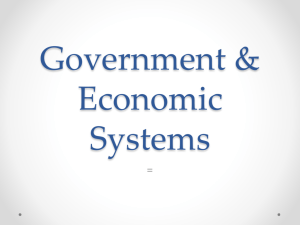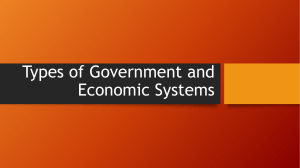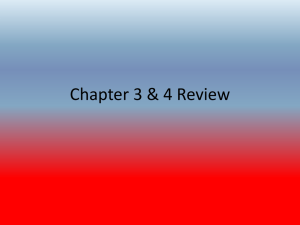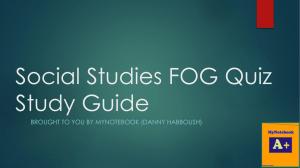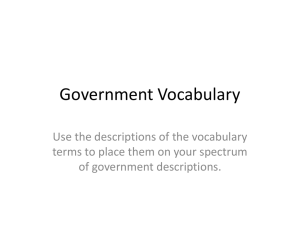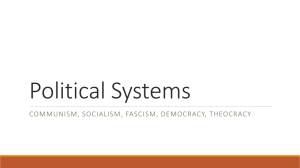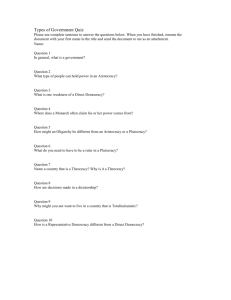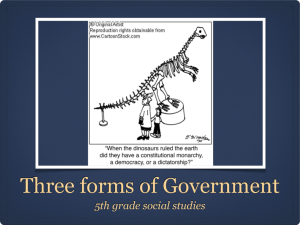Forms of Governments 2014
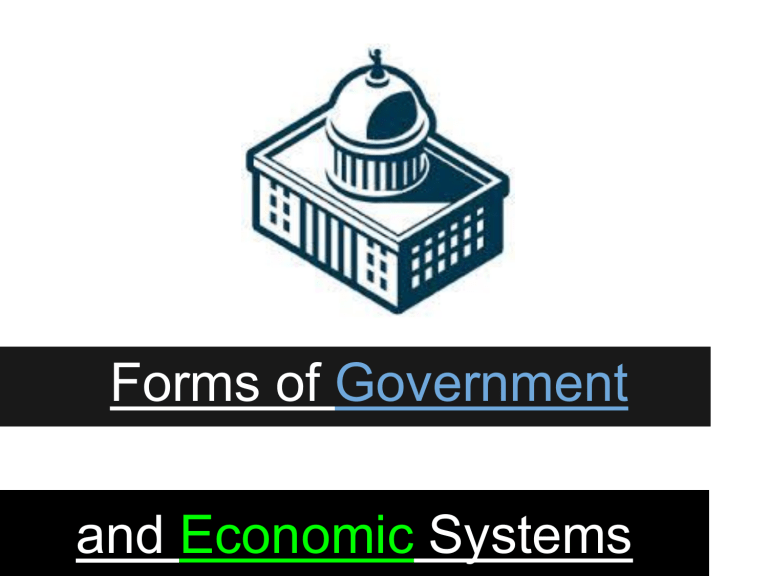
Forms of Government and Economic Systems
Cornell Notes
Forms of Government
Notes Forms of
Government
Key Points
Government
Cornell Notes
Forms of Government
Notes Forms of
Government
Key Points
Government - Gov is social control
- they make laws and enforce them
- power can be held by one, few, or many
- constitution determines Gov.
What is
Government?
Government is a system of social control in which a particular group in society is given the power to make laws and enforce them .
Government power can be held by one individual , a few , or a majority .
A Little More About
Government…
•
•
• Governments come in different forms .
A constitution is the basic law determining the form of government.
The constitution may be written, as in the
United States, or largely unwritten, as in Great
Britain.
Government’s jobs include:
• providing for the security of their country
• keeping order
• establishing a system of justice so that people are treated fairly
• providing welfare services to those in need
• regulating the economy
• establishing educational systems
***In extreme cases of governmental regulation, every aspect of people's lives is controlled. This is called totalitarianism . Can you think of a novel that has a totalitarian government?
Forms of Government
We will be learning about the following forms of government:
• Democracy
• Monarchy
• Theocracy
• Dictatorship
• Transitional
Economic
Systems
And a few economic systems…because they are closely connected to governments!
• Capitalism
• Socialism
• Communism
Forms of
Government
Democracy
-
Supreme power is given to the people .
-Democratic countries have free elections where all citizens have a vote.
Democratic Countries
Today
• United States of America
• Philippines
• Italy
• Japan
• Singapore
Monarchy
• Rule by a single person (a king or queen ), who is the permanent head of state. The term is now used to refer to countries with hereditary rulers. This means that rule is passed down from parent to child.
• Constitutional monarchies are more common today. Under this system, the powers of the king or queen are restricted to those granted in the constitution.
• Most constitutional monarchies use a parliamentary system in which the king or queen may have strictly ceremonial duties.
They often have an elected prime minister who is the head of government.
Monarchy
Examples of countries with monarchies today:
• Saudi Arabia
• Brunei
• Qatar
• Oman
• UAE
• Great Britain (Constitutional Monarchy)
• Belgium (CM)
• Morocco (CM)
• Bhutan (CM)
Theocracy
• In a theocracy, government leaders are members of the clergy ( church officials ), and the state's legal system is based on religious law.
• Rulers are thought to be “divinely guided”.
Theocracy
Examples of theocracies today:
• Iran
• The Vatican
Pope
Francis
Dictatorship
• A government in which a single leader or party exercises absolute control over all citizens and every aspect of their lives.
• In most cases, this absolute power is exercised in a cruel way.
● Other names for a dictatorship include:
Autocracy, Military Junta, Right Wing,
Authoritarianism, Totalitarianism or
Fascism
Dictatorship
Examples of
Dictatorships today:
• North Korea
• Myanmar (Burma)
• Sudan
Transitional
• A transitional government is one that is in the process of changing from one form to another.
• Countries with transitional governments are often unstable .
Transitional
Examples of countries with transitional governments:
• Egypt
• Afghanistan
• Iraq
• Libya
• Syria (?)
Economic
Systems
Economic
Systems
Economics has to do with the production , distribution and consumption of goods and services.
**One minute table talk: What do the words production , distribution and consumption mean?
Capitalism
• An economic system in which individuals and corporations are free to invest in and own all aspect of a business.
• In a capitalist country, people own their own companies and can manage them to earn a profit.
Socialism
• A political and economic system in which some businesses are controlled by the government rather than by individuals.
• In a socialist country, people have equal rights to various benefits (health, education), and there is an effort to limit the inequalities of wealth and power.
• Taxes are often quite high to provide for these benefits.
Communism
• A political and economic system in which the government controls all business.
• Individual people cannot own property or industries and in theory, people of all social classes are treated equally.
• Communist countries have totalitarian governments.
Think of it as a spectrum…
Capitalism Socialism Communism
__________________________________________________
United States
Canada
Sweden
Chi na
Cuba
Let’s Review
Government and Economic Systems
Let’s Review
A government is: A form of social control. Governments make and enforce laws. A government is created using a constitution.
What are some kinds of governments?
Democracy, monarchy, constitutional monarchy, dictatorship, theocracy, and transitional
What is an economic system?
It is the way a government handles the production, distribution, and consumption of goods. There are three types: capitalism , socialism , and communism .
Let’s Review
Democracy is: A government determined by majority of votes in
USA free elections. A democracy has a president as
The Philippines its head of state.
Monarchy is:
Saudi Arabia
Great Britain
(CM)
● Can take two forms: Traditional and Constitutional .
● Monarchies are hereditary (passed from one family member to the next).
● They have a king/queen .
● In a constitutional monarchy, the king/queen is a figurehead and the prime minister has more power.
Theocracy is:
The Vatican
Iran
A government run by the clergy (officials of a particular church). Their laws are dictated by their religion.
Let’s Review
Dictatorship is: A government determined by majority of votes in free elections. A democracy has a president as
North Korea its head of state.
Transitional is:
Egypt
Syria
Iraq
A government that is in the process of changing from one to another. This is a very unstable form of rule.
Let’s Review
Capitalism is: System where individuals can own or invest in any companies they want.
Socialism is:
A system where the government owns some businesses. People have equal rights to many benefits like health care.
Communism is:
Government owns all businesses, and individuals cannot own property.
